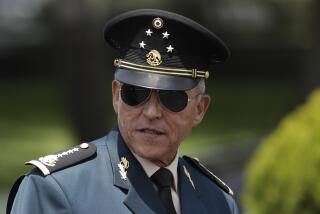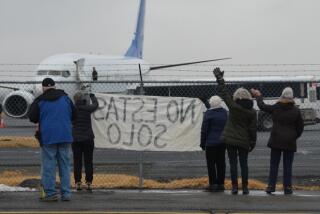Cuba Denounces Defector for ‘Treachery’
WASHINGTON — The Cuban government, in a bitter broadside Friday, denounced a defecting Cuban air force general for “repugnant treachery” as U.S. intelligence agents began debriefing the celebrated war hero at an unknown location.
U.S. intelligence sources said that Brig. Gen. Rafael del Pino Diaz’s greatest value will be his knowledge of Havana’s long-term military intentions, as well as his information on supply problems believed to be plaguing the Cuban military.
“The hardest thing for an intelligence officer to predict is the long-range planning of an unfriendly country,” a Pentagon source said, speaking on condition that he not be named. “A top military staff officer who can provide that information is invaluable.”
High-Ranking Defector
Del Pino, believed to be about 52, is the highest-ranking military official ever to flee the Havana regime of Fidel Castro. The State Department said his exact military status at the time of his defection is unclear, but Cuban refugee sources said that until January, he had served as deputy chief of staff of the air force.
Granma, the newspaper of the Cuban Communist Party, said that Del Pino, honored in Cuba for his role in helping repel the 1961 Bay of Pigs invasion, had recently suffered “from eye problems and recurring states of psychic stress” and was no longer active in the military high command.
Del Pino seized a small government plane Thursday and, with his wife and three children, flew 90 miles to the Boca Chica Naval Air Station in Florida, where he asked for asylum. Friday, he reportedly was being interviewed by CIA and FBI officials.
Cuban refugee groups in the United States hailed the desertion, saying it signals growing disaffection in the upper echelon of Castro’s government.
Castro’s Sister
“Cuba is going from bad to worse despite all their efforts, their promises and their propaganda,” said Juanita Castro, sister of the Cuban president, who has lived in Florida since 1965 and is an outspoken critic of her brother’s regime.
She said the Marxist government must be “very worried” about public reaction to the desertion of such a prominent figure.
The Cuban Communist Party newspaper reported the incident in its editions Friday. Quoting an Armed Forces Ministry statement, it said Del Pino received “promotions, responsibilities and other honors” for his military service.
“Therefore, no action or incident can justify his strange and treacherous conduct,” the party paper said. Del Pino has “irreparably tarnished his life, history and honor by passing to the ranks of the enemy and placing himself at the service of the U.S. imperialists.”
Service in Angola
The Cuban defense agency, the Cuban Revolutionary Armed Forces Ministry, said Del Pino “distinguished himself in 1961 as a pilot” at the Bay of Pigs and also served with Cuban forces in Angola, where Cuba maintains 30,000 troops in support of the Marxist government there.
The ministry added: “Because of a medical recommendation, Del Pino has not been working as a combat pilot because he was suffering from eye problems and recurring states of physical stress” and had been reassigned to work on the establishment of an air force museum.
U.S. officials portrayed the defection as a stinging embarrassment for the Cuban government in the eyes of its people.
“More important than his exact job is the fact that he is a genuine national hero, one of the small number of pilots who helped to repel the invasion at the Bay of Pigs,” a White House official said, speaking on condition that he not be identified.
Officials said they are eager to learn what he might know about Cuba’s military weaknesses, particularly rumored problems in fully equipping its troops.
‘Morale and Attitude’
Edward Gonzalez, a UCLA professor and Rand Corp. consultant specializing in Cuban affairs, said the general “will be able to tell us about the morale and the attitude of the armed forces, particularly with respect to Cuban military operations in Central America and Africa.”
Juanita Iza, spokesman for Independent and Democratic Cuba, a Miami refugee organization, said her group’s information on Del Pino indicates he came to the United States in the 1950s and was graduated from high school here. She said he returned to Havana after Castro’s revolutionary victory and became a pilot in the revolutionary forces.
The Immigration and Naturalization Service has extended a “parole” to Del Pino to allow him, his wife, his 27- and 16-year-old sons and his 2-year-old daughter to live in the United States without a visa.
More to Read
Sign up for Essential California
The most important California stories and recommendations in your inbox every morning.
You may occasionally receive promotional content from the Los Angeles Times.









